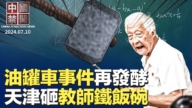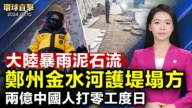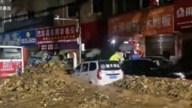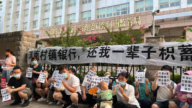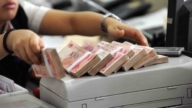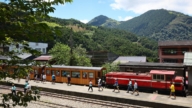【新唐人2011年10月4日讯】中国媒体报导,中国80%的正在建设中的铁路项目已全部“缓建”,等待中国政府澄清高铁政策的相关内容。同时,在信贷紧缩的大环境下,包括商业银行在内的高铁建设的资金提供者们,都在观望着中国高铁政策的下一步。业内人士分析,这将使铁道部更加难以偿还债务,还会波及许多供应商。
《21世纪经济》报导,10月1号引述一位铁道部的人士说,当前超过80%的在建铁路项目,已经全线“缓建”,不少项目的完工时间被延后了一年。
这名消息人士说,铁路项目缓建的原因都是因为建设资金未能及时到位。而三角债也是困扰中国铁路建设的一大问题。他表示,几乎所有的银行都已经暂停向铁路发放贷款。
中国铁路工程师吕涛表示,由于铁道部经济责任不明晰,没有人关心投资收益,在任期间,花越多的钱就能拿出政绩,也可以得到巨额的回扣,在这样的体制下,高铁建设陷入资金困境一点也不奇怪。
中国铁路工程师吕涛:“因为投资收益它根本不成比例,你不管是银行贷款,债券还是上市,最后大家发现它是一个无底洞,所以大家也不能再跟进了。所以这次温州的动车事故呢应该说把这一切都彻底的暴露出来了,同时呢也加速了资金的断裂,所以铁路高速投资已经无路可走了,也就造成了很多在建工程它被迫搁置。”
“7•23”甬温线动车追尾事故,引发了外界对中国高铁项目安全性的质疑,中共政府被迫叫停了所有新高铁项目,下一步该如何走,还没有一个定调。另外一位铁道部内部人士的消息指出,事故后,中国与国外公司合作的境外高铁建设项目,也已经全部暂停。
《华尔街日报》说,“7•23”事故发生后,铁道部在国内债券市场的借款成本已大幅上升,而中国铁道部现在还面临高额的负债。据铁道部数据显示,2011年上半年主要财务及经营数据报告,截至今年6月底,铁道部总负债达到2.09万亿元。
中国铁路工程师吕涛:“万亿的高铁投资并没有真正解决中国铁路客运的瓶颈问题。提高速度并解决不了买票难、乘车难的问题。而且有些线路因为采用动车组或者高铁,取代了普通列车的车次,实际的运能还是下降了。巨额的铁路投资呢,应该说没有能快速的提高铁路客运的运能,经济收益也没有明显提高,这是一个决策性的失误。”
吕涛表示,目前的“缓建”不止给铁道部带来还债的压力,还会连锁反映,殃及许多高铁供应商。
中国铁路工程师吕涛:“所有有关的这些供应商,应该说全部都为高铁加大投入,也都是借款哪、欠款哪,然后期望上市,但是反过来铁道部这一面它并没有钱来支付这些供应商,很多都全部都拖欠着。但现在应该说走到头了,高铁的盲目建设现在已经被迫叫停了,这等于把很多一系列的企业都推到了破产的边缘。”
消息人士说,等“7•23”事故的调查报告,以及铁路安全大排查的调查报告公布之后,对高铁后续发展的定调也会明晰。不过业内人士表示,由于政府各部门内部利益纠葛,估计调查会遇到很大的阻力和困难。
新唐人记者陈汉、尚燕、李若琳采访报导。
80% Of High-speed Rail Projects Halted
Chinese media reported that 80% of China’s high-speed
railway projects under construction have been “postponed,"
waiting for the Chinese government to clarify policies
related to the high-speed rails.
Meanwhile, under the circumstance of credit squeeze,
the funds providers for high-speed railway construction,
including commercial banks, are waiting to see the next
policies of China’s high-speed rails.
Insiders point out, this will make more difficult for Railways
Ministry to repay debts and will affect many suppliers.
On October 1, “21st Century Economic Report" quoted
the words of a Ministry of Railways’ insider,
that over 80% of current railway projects under construction
are postponed, with their completion time delayed for a year.
According to the source, the reason for that
is the lack of money at this point in time.
Debt default is also a major problem in railway construction,
with almost all banks suspending loans for railway projects.
Lu Tao, a Chinese railway engineer, said the economic
responsibility of the Ministry of Railways is not clear,
thus nobody thinks of investment returns. Officials can show
performance and get big rebate from spending more money.
In this system, the financial difficulties encountered in
the construction of high-speed rails are not surprising.
Lu Tao: “Because the investment income is out
of proportion, whether it’s bank loans or market bonds,
we found it to be a bottomless pit in the end.
So people will not follow this up anymore.
Wenzhou’s train accident has exposed it thoroughly now.
At the same time it accelerated the rupture of funds.
So there is no way out for investment of high-speed railway.
It makes a lot of projects under construction to be set aside.”
The train accident of 7/23 Yongwen line led
to the security doubt of China’s high-speed rail projects.
Chinese government was forced to halt all new high-speed
rail projects. There is no decision for the next step.
Information by another Ministry of Railways insider
points out that after the accidents in China,
overseas high-speed rail projects between China
and foreign companies have all been halted.
Wall Street Journal reported that after the 7/ 23 accident,
the cost of borrowing money for Ministry of Railways
in the domestic bond market is going up substantially. And
the Railways Ministry is now confronted with high liabilities.
According to data from the Railways Ministry (Report
of main finance and operation in the first half of 2011),
at the end of June this year, the total liabilities
of the Ministry of Railways reached RMB2.09 trillion.
Lu Tao: “Trillions RMB of high-speed rail investment doesn’t
resolve transportation’ bottlenecks for China’s passengers.
Increasing the train speed can not resolve the difficulties
of buying tickets and using trains.
Actual transport capacity was decreased when motor train
units or high-speed rails replaced other trains in some lines.
The huge investment has not been able to increase
the transportation capacity for the railway passengers.
The economic benefits have not been significantly notable.
This is a decision-making error."
Lu Tao said the currently postponed construction
not only brings debt pressure on the Ministry of Railways,
but also leads to a chain reaction,
affecting a lot of high-speed rail suppliers.
Lu Tao: “All these suppliers have increased investments for
high-speed construction. They borrowed money, owe money
and expect to be listed. However, the Railways Ministry has
no money to pay these suppliers, many of whom defaulted.
It goes like that to the very end. The blind construction
of high-speed rails has been forced to halt now,
which means to push many companies
to the brink of bankruptcy. “
The source said that after releasing the 7/23 accident’
investigation reports and railway safety information,
the issue of the follow-up development of high-speed rails
will become more clear.
However, insiders estimate that the investigation
would encounter strong resistance and difficulties,
because of conflicting interests among various
departments and levels of government.
NTD reporters Chen Han, Shang Yan and Li Ruilin






